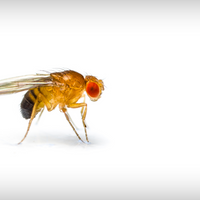In a study recently done by Doris Bachtrog, it was confirmed that the male Y chromosome in flies contributes to a shorter life span. She and her team compared the amount of heterochromatin in young and old male and female flies, and discovered that in males, the amount of heterochromatin (densely packed DNA), was far less than it was in females. The amount of heterochromatin was especially lower in the male's Y chromosome. To further test their hypothesis, they looked at the amount of heterochromatin in XXY females, XYY males, and XO males. They discovered that in the females with a Y chromosome and the males with an extra Y chromosome, the amount of heterochromatin was less, and consequently, life span was reduced. To further confirm the hypothesis that heterochromatin loss shortens life span, the XO males in the experiment lived longer than XY males. After reading this article, it makes sense that a loss of heterochromatin would contribute to aging and early death because a change or loss of heterochromatin is ultimately damaging DNA. A question I would ask would be, does this also take place in humans? Does the loss of heterochromatin, especially in the Y chromosome, shorten the lifespan of human males, like it does in male Drosophila? Women do tend to live longer than men... is this because of the men's Y chromosome? Overall, I thought the article was very informative and I especially appreciated how Bachtrog and her team did multiple studies to test their hypothesis, especially on flies with abnormal numbers of Y chromosomes.
https://www.the-scientist.com/the-literature/male-flies-y-chromosome-may-contribute-to-earlier-deaths-67683
https://www.nature.com/articles/s12276-020-00497-4
https://www.sciencedirect.com/topics/neuroscience/heterochromatin

This is a very interesting post. I do wonder if this is the same in humans as well, but I hypothesize it is true but to a lesser extent. I imagine that it makes such a difference in Drosophila due to their already short life span, but since humans have a fairly lengthy life span, it would barely make a dent. However, this probably would be difficult to conduct research on and it would depend on the amount of heterochromatin lost. All in all, a very interesting post!
ReplyDelete